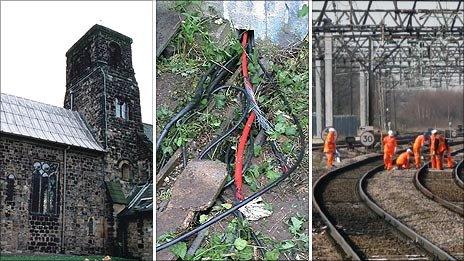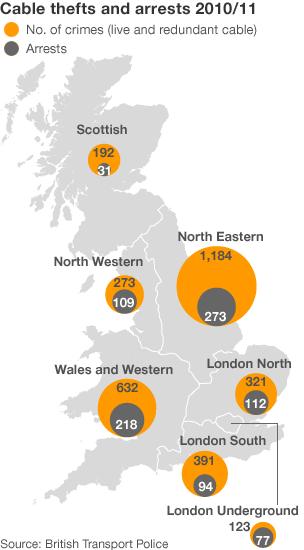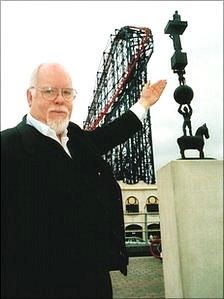Metal theft: Britain's most annoying crime wave
- Published
- comments

A train operator wants the law changed to tackle the rise in metal thefts. But what are the serious and sometimes strange consequences of this crime wave?
One copper cable theft from a railway line. The result? A total of 108 trains delayed, 17 hours worth of hold-ups for thousands of passengers and damage put at over £80,000. Plus, probably, £50 for the thieves.
And these are the consequences of just one of three thefts in West Yorkshire on the East Coast Main Line in a single night last month.
Network Rail, which is responsible for the UK's rail infrastructure, says the situation is getting worse. On average there are currently six thefts a day across the country.
The past year has seen a huge jump in metal thefts, with a rise in the price of metals such as copper and lead being blamed. The rise is being driven by global demand prompted by China and other booming economies.
This week train operator Nexus, which runs the Metro system in Tyne and Wear, has called for new regulation of scrapyards to stop the crime wave.
The plague of metal theft is having an impact on most people, not just rail companies.
Train delays
Next time your train is delayed or cancelled due to "signalling problems" there's a good chance it will be the fault of metal thieves.

Power and signalling cables, overhead line equipment, even the clips used to hold rails in place are all being stolen on a daily basis.
The consequence for rail users was a staggering 6,088 hours of delays last year, says Network Rail. It saw a 52% leap in the number of thefts from April 2010 to April this year, in total 995 incidents. It paid out £16.5m in repairs and compensation as a result.
Even if a single inch of cable is taken it can translate into long delays, says a spokeswoman for Network Rail. Some cables have up to 48 tiny copper strands in them that all need to be reconnected at both ends and tested before things can get moving again.
"We have dedicated response teams but it's not a quick job," she says.
British Transport Police say the thefts can vary greatly in size but are mostly petty - the "cottage industry end".
"But the number of thefts is huge," says a spokesman. "It is our biggest crime problem in terms of frequency and our biggest challenge after counter-terrorism.
"There are actually very small rewards in it for the thieves, but it's the instant cash that attracts them."
Fibreglass statues
Public artworks are increasingly being remade of fibreglass as a result of metal thefts. Not only is stolen work being replaced this way, in some cases public art is being taken into secure storage for safety and replaced with a fibreglass copy.

Sir Peter Blake created the artwork in 2004
"It's a solution to an extremely depressing situation," says Peter Brown, chairman of the Public Monuments and Sculpture Association (PSMA). "What thieves don't seem to understand is how little metal there usually is in artworks and statues. They will make hardly any money from them. With the cost and effort of stealing them, you wonder why they bother."
But in some cases it is impossible to make replicas because the statues are too old and no original plans exist.
Blackpool Council has been forced to remove public artwork to safeguard it following two major thefts in July and August. Three of four lead-based figures were taken from a park where they had stood since 1926.
Two weeks later a section of one of two statues designed by Sir Peter Blake was stolen from the promenade. The remaining artworks are now in secure storage. The council says they will all be replaced with replicas.
"It's devastating," says Elaine Smith, chairwoman of the Blackpool Civic Trust. "These statues are part of Blackpool's heritage. To us they are priceless and these thieves will get a few pounds in cash for them."
It's not only artwork that is being changed. Surrey County Council now replaces missing road signs with plastic ones.
Gas explosions and power cuts
Power supply companies were the victim of around 6,000 metal thefts in 2010, equating to a 100% annual increase, according to industry figures.
One problem is that copper piping is often used to connect gas mains to gas meters in UK homes. In July a theft of copper pipes was linked to a gas explosion that wrecked a row of houses in Castleford, West Yorkshire. About 30 people had to be evacuated in the early hours of the morning.
"It's an increasing problem," says Tim Field from the Energy Network Association (ENA), the industry body for companies that carry electricity and gas to UK homes and businesses. "Thieves are taking small lengths of copper pipe that will make them a few pounds and leaving leaking gas that could cost people their lives."
Some of the pipes are on the outside of properties making them an easy target, but thieves dressed as workmen have even tricked their way into houses to strip them out.
Overhead cables and sub-stations are also targeted. Last month thieves in Wisbech, Cambridgeshire, caused an explosion which cut power to 1,700 homes. The Red Cross had to be called in to care for vulnerable residents.
"These power cuts not only cause chaos in homes, they hit hospitals and schools. It could even impact on 999 services," says Field.
Scrap dealers
The metal recycling industry in the UK is a lucrative business worth £5bn annually, but thefts are hitting it hard too. Over 15,000 tonnes of metal is stolen in the UK each year. Over half is taken from scrap dealers themselves, says Ian Hetherington, director general of the British Metals Recycling Association (BMRA).
"In one case recently thieves stole a train with two trucks full of scrap metal attached. They drove it down the line and offloaded the metal into lorries. Scrap dealers are spending a fortune on security, but the thieves are very resourceful.
"Like everyone else we have seen a progressive rise in thefts since 2006, but now the recession is really taking its toll.
"We are seeing lot more smaller thefts, people who will jump over the fence, take some metal and then walk round to the front gate and try and sell it back to you."
The unexpected
Councils have reported streets being stripped of drain covers and supermarkets have lost hundreds of shopping trolleys in a matter of days. Letterboxes, charity clothing banks and door handles have also been taken.
And it seems nothing is off limits. Police have had reports of wheelchair ramps being stolen and children's playgrounds being stripped. Blackpool's model village, a popular tourist attraction, was even targeted.
"The small lead roof tiles on the miniature houses were stolen. The metal thieves are taking everything, I've never known anything like it," says Smith, from the Blackpool Civic Trust.
A quarter of Hertfordshire lost its broadband connection last year because of telecoms cable theft.
Lambeth Council in London has been forced to close a library after it was flooded in heavy rain because thieves stole the copper roof. The lead in the lettering on gravestones and memorials at a local cemetery have also been taken.
"It's appalling that thieves should target public buildings like libraries," says councillor Florence Nosegbe, a cabinet member for culture on Lambeth Council.
"But it's one thing to steal the copper from the roof of the library, it's another to damage memorials of loved ones by ripping out the lead lettering at the crematorium. This was a truly shocking and heartless act, for what would be only a few kilos of scrap metal."